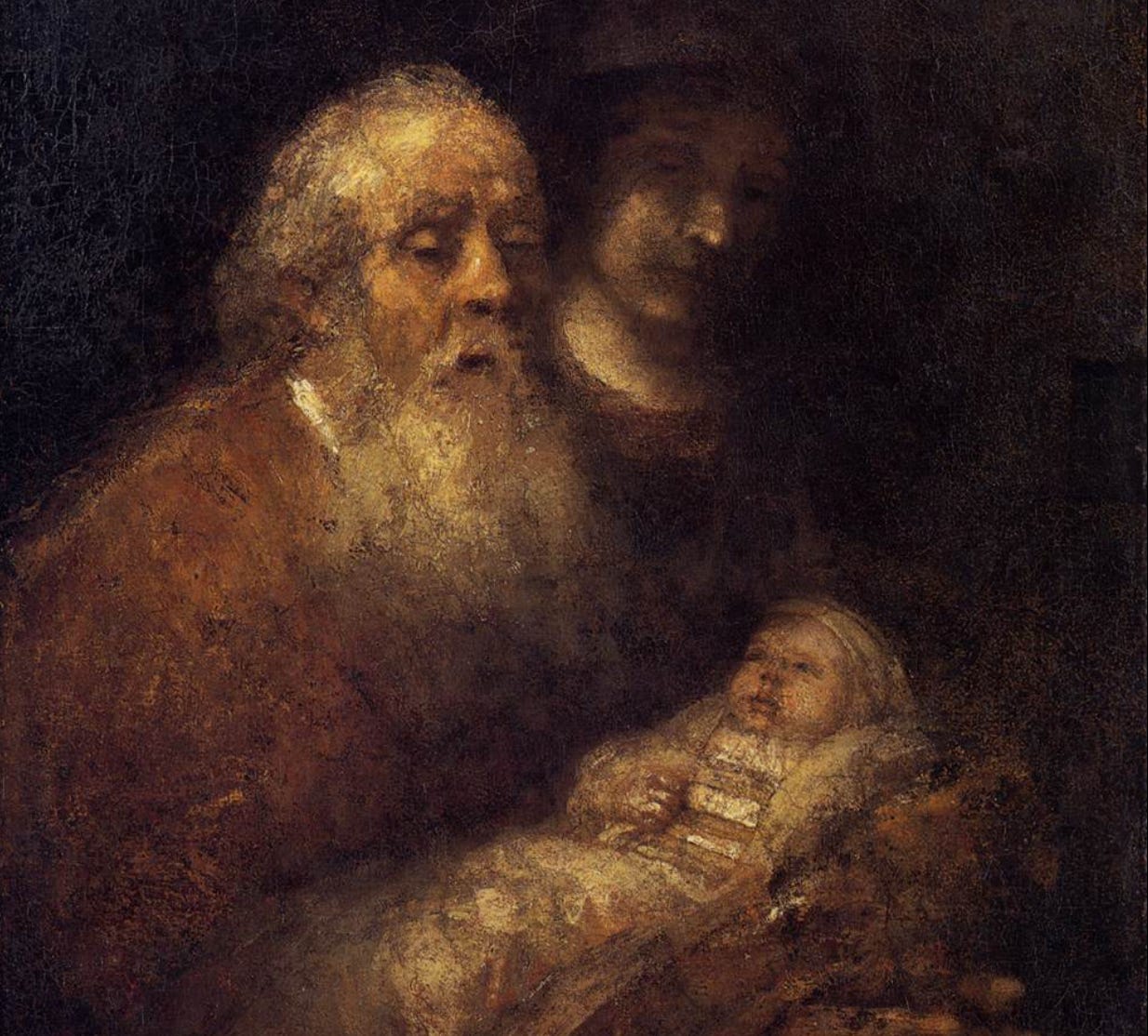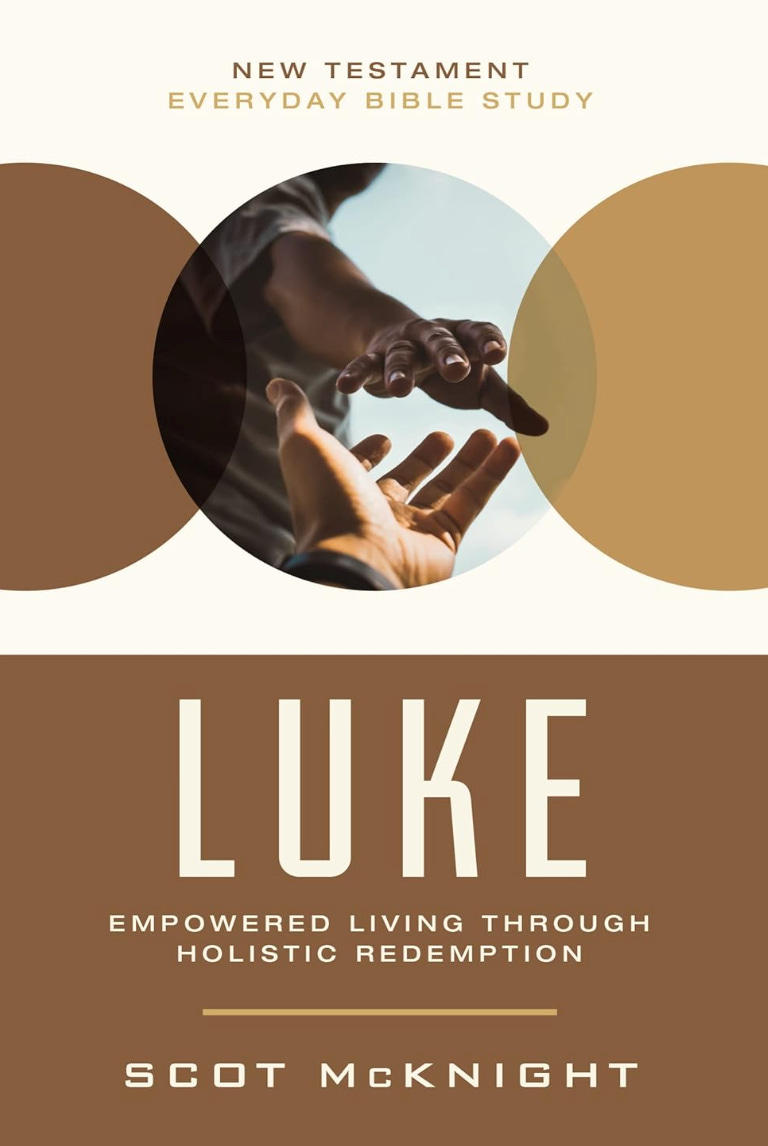
From the Everyday Bible Study, Luke, questions by Becky Castle Miller.
https://en.wikipedia.org/wiki/Simeon_in_the_Temple#/media/File:Rembrandt_-_Circumcision_-_WGA19111.jpg
Luke 2:21-39
21 On the eighth day, when it was time to circumcise the child, he was named Jesus, the name the angel had given him before he was conceived. 22 When the time came for the purification rites required by the Law of Moses, Joseph and Mary took him to Jerusalem to present him to the Lord 23 (as it is written in the Law of the Lord, “Every firstborn male is to be consecrated to the Lord” ), 24 and to offer a sacrifice in keeping with what is said in the Law of the Lord: “a pair of doves or two young pigeons.”
Simeon
25 Now there was a man in Jerusalem called Simeon, who was righteous and devout. He was waiting for the consolation of Israel, and the Holy Spirit was on him. 26 It had been revealed to him by the Holy Spirit that he would not die before he had seen the Lord’s Messiah. 27 Moved by the Spirit, he went into the temple courts. When the parents brought in the child Jesus to do for him what the custom of the Law required, 28 Simeon took him in his arms and praised God, saying:
29 “Sovereign Lord, as you have promised,
you may now dismiss your servant in peace.
30 For my eyes have seen your salvation,
31 which you have prepared in the sight of all nations:
32 a light for revelation to the Gentiles,
and the glory of your people Israel.”
33 The child’s father and mother marveled at what was said about him. 34 Then Simeon blessed them and said to Mary, his mother: “This child is destined to cause the falling and rising of many in Israel, and to be a sign that will be spoken against, 35 so that the thoughts of many hearts will be revealed. And a sword will pierce your own soul too.”
Anna
36 There was also a prophet, Anna, the daughter of Penuel, of the tribe of Asher. She was very old; she had lived with her husband seven years after her marriage, 37 and then was a widow until she was eighty-four. She never left the temple but worshiped night and day, fasting and praying. 38 Coming up to them at that very moment, she gave thanks to God and spoke about the child to all who were looking forward to the redemption of Jerusalem.
39 When Joseph and Mary had done everything required by the Law of the Lord, they returned to Galilee to their own town of Nazareth.
Joseph and Mary were observant Jews and, like most, knew how to usher Jesus into a life as an Israelite. First, on the 8th day he had to be circumcised (2:21) and thirty-two days later (Leviticus 12:2-6), second, only Mary needed to be purified (not from sin) and along with that, third, Jesus could be presented (like Samuel; 1 Samuel 2:24; also Exodus 12; 13:11-15) in the temple with an offering (2:22-24). Everything sounds so observant until two senior citizens interrupt Joseph and Mary’s temple worship with Spirit-prompted words.
Simeon and Anna are two of my favorite characters from the beginning of Matthew’s Gospel to the end of the Gospel of John. One of them turned into an indelible tune when Michael Card wrote his beautiful song about Simeon (“Now That I’ve Held Him in His Arms”). Each in their own way, prompted by the Spirit that was at work in Mary, Elizabeth, and Zechariah, witness to redemption in Jesus. They recognize through the Spirit the presence of God’s redemption in this baby as his parents bring him to the temple.
They are word-witnesses from two genders, and each of their witnesses can be shaped by one word. Both words, however, need some spelling out, but remember that both words are about what Jesus will accomplish. The two aged temple worshipers get lost in the wonder of their witness.
Simeon’s Word of Witness: Consolation?
Luke pins all the right biblical terms on Simeon: he is “righteous” because he’s known for being observant to the law, and he is “devout” in the sense that his conduct is deeply affirmed (2:25). But our focus is on this expression: “he was waiting [longingly, expectantly] for the consolation of Israel” (2:25). The word “consolation” for some of us will evoke empathy for those who have lost a loved one. The term in Luke evokes for its readers Isaiah 40’s famous words: “Comfort, comfort my people” and “Speak tenderly” to her because “her hard service” in Babylon’s exile “has been completed” and “her sin has been paid for.” In fact, she has experienced “double for all her sins” (40:1-2). The famous “in the wilderness prepare a way for the LORD” comes next and that sends us into Luke chapter three for John the Baptist, and we are off and running sprints to keep up with Luke.
So we have to look at this term. Not only does it evoke Isaiah’s promise that the exile would end, that Judah would return to the Land and to Jerusalem, but that language became popular for the arrival of the kingdom of God. Simeon himself saw in this baby the end of all exiles and the inauguration of the kingdom. But there’s more: this term evokes the Holy Spirit as the “Paraclete” (John 14-16), which suggests the Spirit, who Luke tells us is “on him” (Luke 2:25), integrates Isaiah’s “consolation” into the one’s personal and community life. That Spirit divulged to Simeon he’d get to see with his own eyes “the Lord’s Messiah” before he died (2:26).
When he did see the baby boy he sang a new redemption song, which we call Nunc dimittis (“now dismiss”), with the following highlights: he’s now ready to die because his dream has come true (2:29). His words “dismiss … in peace” points to more than inner peace because he knows the Messiah brings peace on earth (2:14). The baby is “salvation” in a boy, but the redemption this baby brings is “for all nations” (2:30). He delineates the meaning of salvation: “revelation” of something new for “Gentiles” and “glory” for God’s elect people Israel (2:31-32).
The Spirit unveils a dark side to this Messiah’s redemption: he will cause “the falling and rising of many” and he will be “spoken against” (we’ll get to that over and over in this Gospel), and he will unveil “thoughts of many hearts” and then he thrusts a dagger into Mary: “a sword will pierce your own soul too” (2:33-35).
These words portend the whole Gospel of Luke.
Anna’s Word of Witness: Redemption?
What the prophet, widowed (for either 77 or 84 years) Anna said, unfortunately, is not recorded. We get the gist of this constant presence in the temple instead. That gist can be reduced to one word that says all that Simeon sang. Luke 2:38 says she “gave thanks to God,” though that translation only glimpses the sophisticated term Luke used. His term suggests “openly confessing” or “announcing” or “acknowledging, which she did to “all” those who like Simeon were longing for the kingdom of God. Luke’s words are “the redemption of Jerusalem,” and once again I suggest we can do better than the term “redemption.” The word evokes, as did Simeon’s words, Isaiah. The term means “liberation” from captivity, from exile, from bondage, and from unfulfilled expectations. That idea of liberation sends us straight back a page to Zechariah’s song when he prophesied of “salvation from our enemies” (1:71).
Anna’s message is about the “child.” She is a witness to others about Jesus and what will be accomplished through Jesus.
These two witnesses prophesy vital information about what Jesus will accomplish: he will launch the kingdom of God by liberation Israel from its captivities. I must say this: we have sanitized the language of Luke in these two witnesses, resulting in more of a comfortable faith instead of a liberating revolution. Our brothers and sisters who are marginalized hear the words of these two witnesses in ways that many us white Christians do not hear. Nor does the theme of liberation from oppression enter into our heads when we talk about these two senior citizens.
It's time we began.
In what ways did Mary and Joseph properly observe the law following Jesus’s birth?
What does ‘consolation’ mean in Simeon’s story?
What does ‘redemption’ mean in Anna’s story?
What would change for you if you began to understand salvation as holistic liberation?
Image your reaction to meeting and holding the baby Jesus. What might you have experienced/thought/prayed/sung?
Michael Card, “Now That I’ve Held Him in My Arms,” from Legacy, produced by John W. Thompson, Randy Scruggs; words by Michael Card (1983).

















YES!!! Simeon and Anna are two of my most favorite Biblical characters, aided by listening to that same Michael Card song back in the ‘90’s!
The wonderful reality of Holistic Redemption that comes to life with the experiences of “Consolation” and unabashed “Thanksgiving” is life-Opening! Thank you Scot and Becky!!!
Thank you Scott and thank you Becky